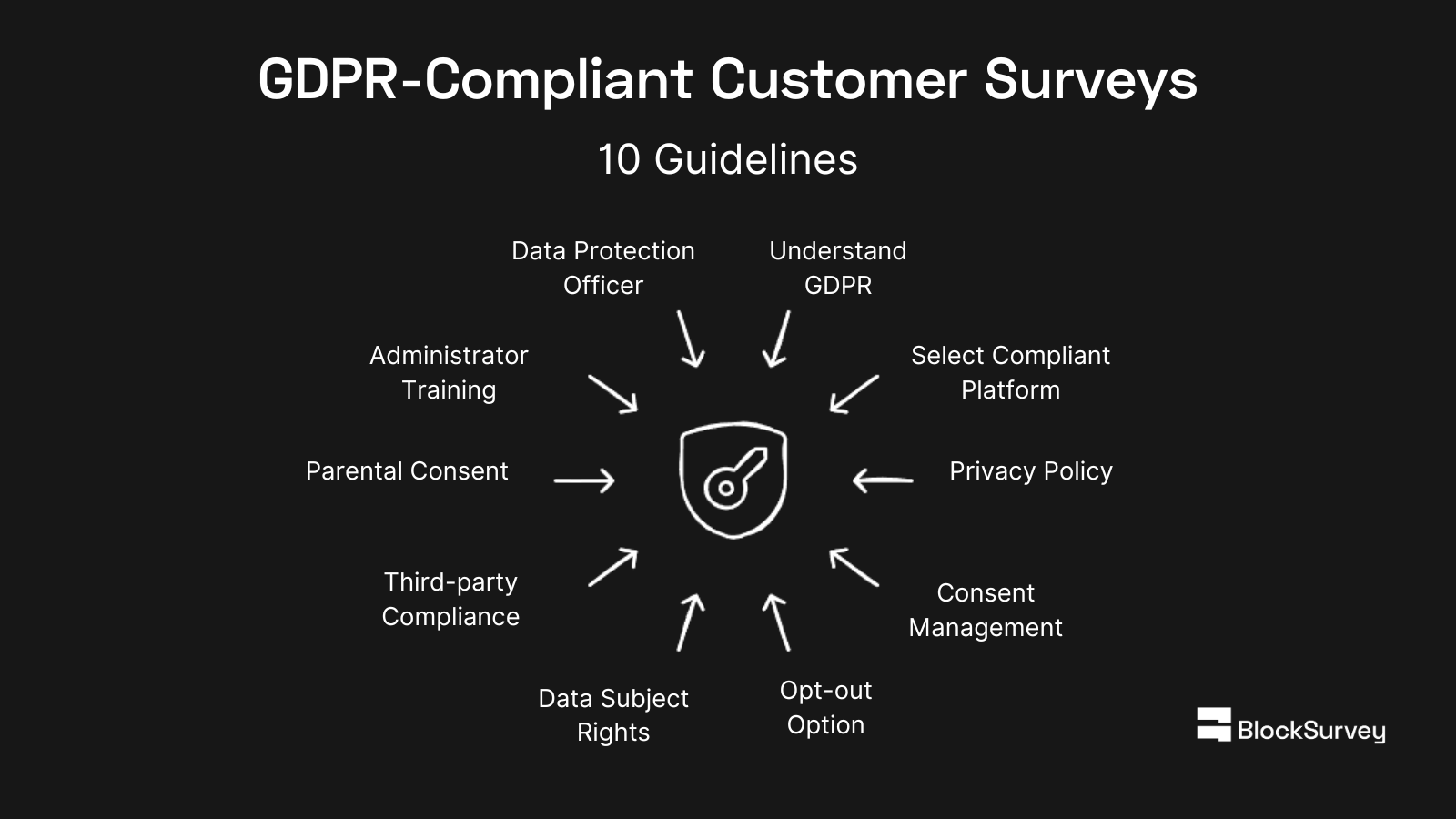Get insights.
Unlock value.
- 14-day free trial
- Set up in minutes
- No credit card required
Guidelines to create GDPR-compliant Customer Satisfaction Survey
Summary: The blog emphasizes that customer data is sensitive and must be handled with care. The blog outlines how the General Data Protection Regulation (GDPR) helps protect the data of European citizens and provides guidelines for creating GDPR-compliant customer satisfaction surveys. Businesses that handle the data of European citizens should understand the GDPR framework, choose a GDPR-compliant survey platform, obtain explicit and granular consent, and appoint a data protection officer.
Are you a startup business owner? Do you want to get customer insights about your product/service? You can run Customer Satisfaction Surveys to get customer feedback. These customer insights can help improve your business process and fix customers' concerns. You must also note that any customer data is very sensitive, and you must handle it with great care and caution.
How can GDPR help Customer Satisfaction Surveys?
GDPR is a data protection act that was introduced in May 2018. GDPR presents stringent guidelines to protect European citizens’ data. For businesses outside Europe that handle European citizens’ data, GDPR still applies.
When any such under-the-radar company collects data as part of a customer satisfaction survey, the European government expects that to be GDPR-compliant. Abiding by GDPR is not only a legal requirement, it also boosts the confidence of your customers. Being GDPR-compliant helps you build trust with your customers.
In the next section, I will discuss guidelines to make your Customer Satisfaction Survey GDPR-compliant.
Guidelines: GDPR-Compliant Customer Satisfaction Survey

Understand GDPR framework
Before creating your Customer Satisfaction Survey, acquaint yourself with the GDPR framework. The GDPR framework has 11 Chapters and 99 articles. Give all Chapters a read. As a business owner, equip yourself with the intricacies and nuances mentioned in the GDPR framework. Alternatively, you can get help from compliance experts if it meets your budget.
Choose GDPR compliant platform
What if your chosen survey platform is already GDPR-compliant? Yes. Survey platforms go through strict audit measures to receive the GDPR certification. A platform like BlockSurvey is GDPR-compliant. It is wise to choose a survey platform like BlockSurvey that is GDPR-compliant. This helps you get all GDPR-related benefits on a platter.
Include a Privacy Policy
What customer data do you collect? How do you store the customer data? How long the customer data will be retained? These are a few questions for which your customers will be seeking answers in the privacy policy. So craft a transparent and honest privacy policy in the language of your customers.
Usually, the privacy policy is placed on the company website, and its link is provided on the survey-taking screens. To ease things, the privacy policy content can also be placed on the survey-taking screen.
Make sure to place a privacy policy in your customer satisfaction survey.
Get Explicit & Granular Consent
Make sure you obtain consent in your customer satisfaction survey. Your consent should be explicit & granular.
Explicit in the sense of avoiding pre-ticked check boxes for obtaining consent. The customer should cautiously make an effort to tick the checkbox while providing consent.
Granular in the sense consent should be obtained for every activity you perform with the data. Separate consent for processing data, sending newsletters & so on.
Option for Opt-out
When you send out your customer satisfaction survey through email, provide the option to opt out of future emails regarding the survey.
In BlockSurvey, no data will be collected unless the customer clicks the submit button while taking surveys. This provides a chance for the customer to opt out of providing feedback even while taking the survey.
Data Subject Rights
To make things clear,
- Your customer is your data subject.
- You as the business owner is the data controller.
- The Survey platform is the data processor.
- A third-party vendor is a sub-processor.
The data subject rights are at the core of the GDPR framework. The framework is crafted in the best interest of the customers. The data subject has the following rights.
- Right to information
- Right to modify data
- Right to delete data
Any request from Data subjects, based on their rights should be carefully and cautiously handled by the data controller. Certain platforms provide login credentials to data subjects to access, modify and delete data themselves. When no login facility is provided, the support team handles the requests. As a rule of thumb, always aim to collect minimal data from the customers.
Third-party Compliance
As mentioned earlier, third-party companies are called as sub-processors.
Most survey platforms provide integration facilities with other products. In this case, the survey platform should make sure the third-party facilities are also GDPR-compliant. They must sign an agreement mentioning adherence to their GDPR compliance.
Parental Consent
What if your customers are children & adolescents? GDPR considers them too in its framework.
- For children less than 13 years old, no personal information should be collected.
- For children less than 16 years old, parental consent is required. This age limit can change based on local preferences.
Train Administrators
It is wise to train your survey administrators on the GDPR framework once annually. Apart from handling the technicalities of creating surveys, they must also get a full grasp of the GDPR framework. In this way, while crafting customer satisfaction surveys, they will put their best foot forward to comply with GDPR.
Data Protection Officer
Under GDPR, it is important to appoint a Data protection officer, who will be the primary point of contact. It is the responsibility of the data protection officer to notify the authorities & customers within 72 hours, in case of a data breach. If your company is too small to have a Data protection officer, as a business owner you can take the role of data protection officer.
How BlockSurvey can help?
BlockSurvey, being a privacy-focused data collection platform, can help you create customer satisfaction surveys with great care. This platform is end-to-end encrypted. You own your data. Even BlockSurvey cannot see your or your customer’s data.
BlockSurvey’s unique Anonymous Seal feature helps craft GDPR-compliant customer satisfaction surveys that restrict the collection of Personally identifiable information like name, phone number, email, biometrics, IP address, etc.
BlockSurvey provides AI assistance & pre-built templates to start your survey journey.
Overall, BlockSurvey is better positioned to create GDPR-compliant customer satisfaction surveys.
Final Thoughts
Remember more than a legal requirement, GDPR is a confidence booster. Abiding by its requirements not only helps you avoid hefty fines, it also helps build trust with your customers.
Our team can help you. Want to create your GDPR-compliant customer satisfaction survey? Book a demo with us.
Have other ideas? Want to learn more about GDPR? Refer to our comprehensive GDPR articles.
We love to see you succeed.
Guidelines to create GDPR-compliant Customer Satisfaction Survey FAQ
What are the penalties for not complying with GDPR?
Organizations that violate GDPR can be fined up to €20 million, or 4% of their annual global turnover, whichever is higher.
Does GDPR apply to customer satisfaction surveys conducted over the phone?
Yes, GDPR applies to all forms of data collection, including phone surveys. It's important to obtain consent from individuals before collecting their data and to ensure that the data is processed lawfully and fairly.
Can I use incentives to encourage customers to participate in my survey?
While incentives can be used, you must ensure that they do not unduly influence individuals to provide their personal data. The incentive should be reasonable and not create pressure on the individual to consent. The individual should still have a genuine choice whether or not to participate in the survey.
What are the best practices for storing customer data collected through surveys in a GDPR-compliant manner?
Minimize data retention: Only store data for as long as necessary for the specified purpose. Implement appropriate security measures: Use encryption, access controls, and other security measures to protect personal data. Regularly review and update security practices: Stay informed about evolving threats and adapt your security measures accordingly.
Get insights.
Unlock value.
- 14-day free trial
- Set up in minutes
- No credit card required


